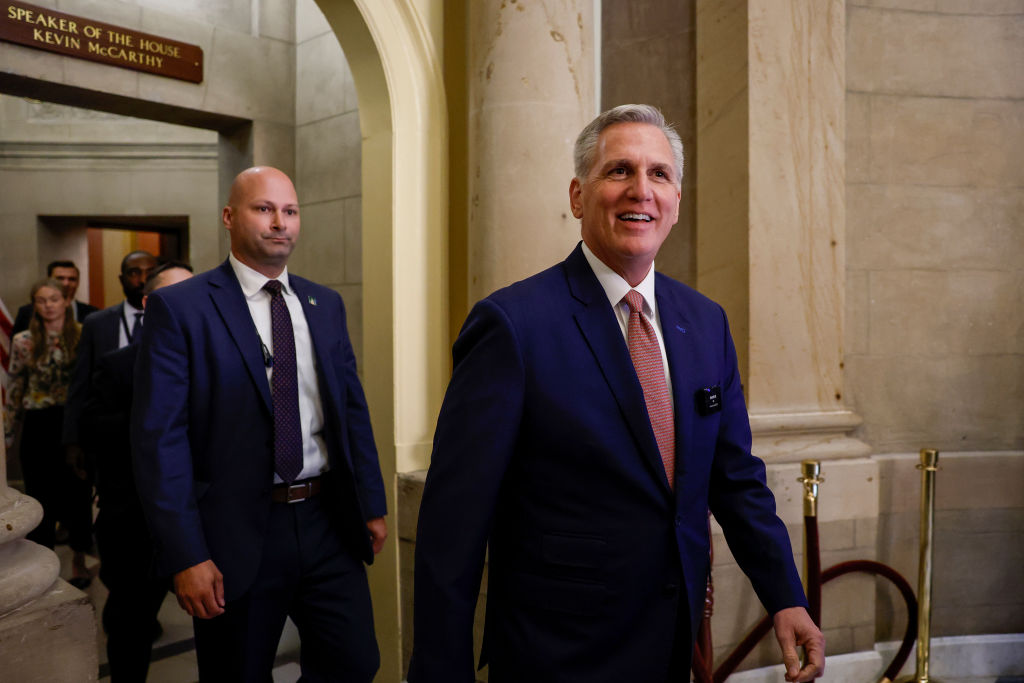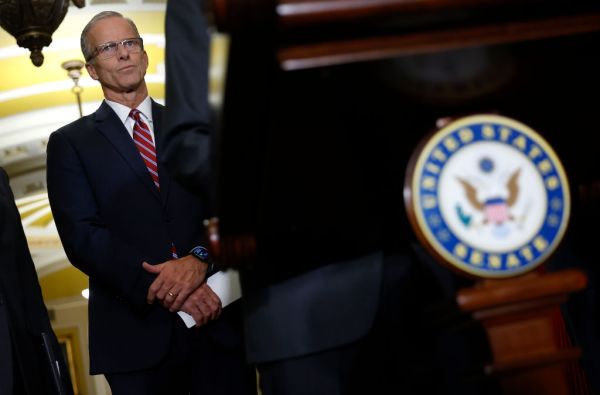Most prominent populist Republicans hate it, theatrically so.
If you’re not sure how seriously to take them, let me demonstrate in two soundbites. One comes from the governor of Florida, speaking on Monday.
The other comes from the governor of Florida, speaking at the beginning of March.
Florida Gov. Ron DeSantis on Thursday distanced himself from his past support for privatizing Social Security and raising the retirement age as potential future political foes seize on his previous ideas for the popular retirement program.
“We’re not going to mess with Social Security as Republicans,” DeSantis told Fox News. “I think that that’s pretty clear.”
…
“There’s a lot of the budget people used to say, they would blame Social Security or Medicare for budget woes. But the reality is they have printed trillions and trillions of dollars, and that has really fueled the inflation,” the governor said.
DeSantis and the rest aren’t wrong to find Kevin McCarthy’s debt-ceiling agreement with the White House underwhelming. It caps non-defense discretionary spending for two years, not the hoped-for 10. In an era when the U.S. routinely runs annual deficits well north of $1 trillion, the deal would trim just $55 billion in spending next year and $81 billion in 2025. It leaves Joe Biden’s dubious forgiveness of student debt intact; it claws back only $20 billion of the $80 billion appropriated for IRS expansion; it modestly extends the age single adults will be required to work in order to receive food stamps, from 49 to 54.
Even the meager “savings” in the bill might not be savings in the end. Economist Brian Riedl explained to my colleagues at The Morning Dispatch that all $28 billion in COVID relief money clawed back under the deal might be reappropriated toward other forms of discretionary spending—no matter if less than the full $28 billion was likely to be spent on COVID to begin with.
The terms look like what might come out of a regular ol’ budget negotiation, lacking any sort of major concession that might meaningfully change the country’s fiscal trajectory, as one might expect from a high-stakes debt-ceiling hostage crisis.
We are indeed careening toward bankruptcy, in other words.
But we’d still be careening toward bankruptcy, albeit at a slightly slower speed, had the White House rubber-stamped the Limit, Save, Grow Act passed by McCarthy’s caucus last month. Assuming Ron DeSantis means what he says about Republicans not tinkering with Social Security, we would be careening toward bankruptcy at an as yet undetermined rate under his presidential administration as well. No one with influence on either side wants to address entitlements, defense spending, or debt servicing, the actual drivers of federal borrowing, so there was never any endgame to this process that wouldn’t have amounted to careening toward bankruptcy.
DeSantis knows it. So do other ostensibly “serious” fiscal hawks, like Rep. Chip Roy, who are caterwauling about their betrayal today. Ben Shapiro put it well: “I fail to understand why conservatives are more agitated over McCarthy’s deal than they were with the fact that with Trump as president and full control of Congress, Republicans increased spending.”
My question for the House’s skeptics of a compromise is this: How could a negotiation between McCarthy and Biden using Limit, Save, Grow as the baseline not have produced a deal that conservatives would find unsatisfying? The White House couldn’t plausibly have agreed to all of the GOP’s demands, as the left would have revolted. The bill was sure to be watered down.
If a watered-down version of LSG was doomed to be unacceptable, why pass LSG in the first place instead of insisting on a more hardline bill involving a balanced-budget amendment or what have you?
The answer, obviously, is that this was a political rather than policy exercise for Republicans all along, including the populists who are claiming to have had their hearts broken by the deal. It was a show about nothing—substantively, at least.
There was no outcome apart from total capitulation by Biden that would have gotten the support of the House Freedom Caucus, and total capitulation was impossible. Roy and the other usual suspects knew it and surely expected from the start to spend the week after a deal was struck dutifully performing their outrage over having been sold out by the establishment yet again.
The “RINO” majority in the Republican conference will be left holding the bag, forced to unite with Democrats on an unpopular vote. The HFC will vote no to protect their right flanks, secure in the knowledge that the bill will pass with bipartisan support anyway and spare the party from the political consequences of a default.
In fact, the RINO majority for this legislation may be larger than expected. (Even Jim Jordan …) McCarthy surely would have gotten Nancy Mace’s centrist-y vote if he needed it; instead Mace is voting no, destined to parlay her break with the leadership into another round of friendly media appearances touting her as a right-wing “maverick.”
The “tell” that the debt-ceiling fight is Kabuki theater even for Republicans who claim to care most about spending is the fact that no one—yet—has called for a vote on removing McCarthy as speaker.
You’ll recall that his most strident critics drove a hard bargain on that point during the negotiations over leadership in January. Initially McCarthy and his allies wanted to require some critical mass of Republicans to support a “motion to vacate the chair” before such a motion could be brought to the floor. But the anti-McCarthy faction stood its ground and forced him to surrender: Under the current rule, any single member can force a vote.
Observers like me looked at that and thought, “He’s a dead duck when it comes time to negotiate over the debt ceiling. Whatever deal he strikes will be deemed too weak for some and he’ll be ousted with Democratic help.”
One shouldn’t underestimate the ability of populist Republicans to talk themselves into doing something foolish and destructive once their base starts egging them on. But as of Tuesday afternoon, not a single member who’s angry about the debt-ceiling deal has vowed to move to vacate the chair. Some have begun chattering about it, obliquely or otherwise, but no one as yet has resolved to follow through.
There are reasons for that. McCarthy has been shrewd about creating an “illusion of power” for House conservatives to placate them; he’s governed reasonably judiciously thus far and his favorable rating reflects that; there’s no obvious consensus replacement as speaker; and it seems a bit (if only a bit) too early in the term for Republicans to descend into leaderless chaos.
Besides, the share of the caucus willing to vote for McCarthy’s removal is destined to be dwarfed by the share that opposes it. To get rid of him, Chip Roy and the rest would need to join with Democrats against their own colleagues, an uncomfortable position for fire-breathing right-wing populists to be in.
Still, fiscal conservatives who were sincerely furious about the debt-ceiling deal wouldn’t let any of that stand in their way. They’d defenestrate McCarthy to show the White House and the speaker’s successor that nothing less than very meaningful spending concessions will suffice to justify raising the debt ceiling. A faction that’s just playing its part in a Kabuki production, on the other hand, will rattle its sabers and then slink away. So far, many sabers have rattled but none have been unsheathed.
Insofar as the deal with Biden lets the Freedom Caucus preen about its ideological purity without blowing up the U.S. economy in the process, it’s a political win for populists.
But it’s a political win for McCarthy and the wider party too, if not as much of one as it seemed a few days ago.
Last week, before the terms of the agreement were announced, it looked as though congressional Democrats would end up more divided than Republicans would. That assumption is now up in smoke; the left clearly got the better of the negotiation on substance. But the speaker impressed in the same way that Chesley “Sully” Sullenberger once did: He’s on the verge of safely landing a vessel that looked to all the world hopelessly dysfunctional and destined to explode.
Except it’s even more amazing than what Sullenberger did since no one believed McCarthy knew how to fly a plane.
If you had told me in January that he’d secure a debt-ceiling deal without tanking markets and without assuring his own ouster, I would have laughed. The vagaries of populist politics required the new Republican House majority to “fight” ruthlessly, leaving McCarthy no choice but to engage in reckless brinkmanship over the debt ceiling. The idea that he might produce 218 votes for a bill as modest as those in Limit, Save, Grow and then another 218 for an even more modest compromise capable of becoming law bordered on fiction.
He’s about to do it. We’ve underestimated him.
The most one can say for his agreement with Biden on the conservative merits is that it involved no tax hikes and halted the trend of the previous Democratic-controlled House in increasing non-defense discretionary spending. Yet, for the moment, there’s been no grassroots revolt by the right against it. Even Trump has bitten his tongue as of Tuesday afternoon despite endorsing a default earlier, possibly thanks to behind-the-scenes lobbying by McCarthy.
Perhaps Republican voters are distracted by the elbows being thrown by Trump and DeSantis at each other. Perhaps they’re quietly nervous about what a default might mean economically and don’t want to press too hard. But it may be that McCarthy learned an important lesson of the Trump years, that appearing to fight is more important to them than fighting successfully.
Declining to hold the debt ceiling hostage was unthinkable but taking the hostage and then surrendering it after a modest standoff was survivable. The speaker may have done just enough to keep Republican populists grudgingly satisfied while showing the rest of America, including and especially its swing voters, that Republicans can govern responsibly.
It’ll be a neat political trick for this era if he manages to land the plane this week without crashing it.
If you’re looking for more meaningful benefits for Republicans from this episode, though, consider two. For populists, the negotiation has normalized—or renormalized, I suppose—using the debt ceiling as leverage for spending cuts. Jonathan Chait writes:
The simplest way to understand the debt-ceiling agreement is that the two parties were focused on different, orthogonal objectives. Democrats wished to minimize the direct harm of the terms of the deal itself to vital government programs, and especially assistance for the poor. Republicans wanted to establish the principle that holding the debt ceiling hostage is a normal, accepted way to govern.
…
When you are holding a gun to the head of the global economy, and both sides understand the president has no option but to pay off the hostage-takers, there’s no natural limit to the size of the ransom. Arguably, Republicans were constrained this time by the desire of most of their caucus to posture against a deal rather than support it, but there’s hardly an iron law requiring such a dynamic.
…
In an iterative game like this, the worst possible move is to insist you won’t submit to extortion and then back down. It destroys not only your credibility but the credibility of your successors.
If Trump is president again come 2025, there’ll be no haggling by Republicans over the debt ceiling, needless to say. The sky will be the limit on spending, as usual when the GOP controls the government. But if Biden is back in charge, the right will seek revenge for yet another painful presidential defeat by demanding steep, likely unreasonable concessions from the White House as a condition of the next debt-ceiling increase.
McCarthy has preemptively validated them by affirming that the debt ceiling is appropriate leverage for Republicans when seeking spending cuts. (Public polling has affirmed it too.) Chait might or might not be right that a Democratic president in 2025 will feel obliged to follow Biden’s lead by ransoming the hostage, but it’s unquestionably true that a Republican speaker will feel obliged to take that hostage. And he or she might not be in a position to surrender it so easily next time.
There’s a benefit to this deal for the rest of the party too, however. McCarthy and the caucus won’t need to worry about this issue next year, when the politics of it would have left him with no room to maneuver.
It was the White House that insisted on raising the debt ceiling through 2024, it’s been reported, but the speaker must have been almost as enthusiastic about that as Biden was. Trump’s appetite for an economic crisis he can weaponize against his opponent is already ravenous; by next summer, with the primaries out of the way, it would have been insatiable. There may have been no concessions McCarthy plausibly could have extracted to satisfy populists under those circumstances. Default would have been viewed as optimal to the extent it isn’t already.
By punting this matter into 2025, the speaker spared his caucus an impossibly difficult vote in the thick of an election campaign, a moment when the grassroots would have been following the matter intently.
And so “a show about nothing” was about something, it turns out, if not much of something.
Once again America’s government embarrassed itself for no good reason, but not nearly as catastrophically as it might have. We continue to careen toward bankruptcy yet have thus far found the collective restraint not to hurtle straight over a cliff toward it, Thelma & Louise-style. Left-wing nihilism about unsustainable spending and right-wing nihilism about brinkmanship somehow haven’t yet produced a fiscal crisis.
But stay tuned. The week is still young.









Please note that we at The Dispatch hold ourselves, our work, and our commenters to a higher standard than other places on the internet. We welcome comments that foster genuine debate or discussion—including comments critical of us or our work—but responses that include ad hominem attacks on fellow Dispatch members or are intended to stoke fear and anger may be moderated.
You are currently using a limited time guest pass and do not have access to commenting. Consider subscribing to join the conversation.
With your membership, you only have the ability to comment on The Morning Dispatch articles. Consider upgrading to join the conversation everywhere.